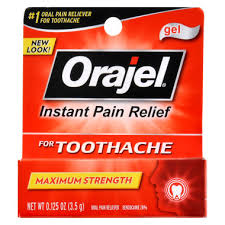 The first thing you should do when you experience severe tooth pain that persists for more than a day or two is call your dentist and make an appointment. For acute tooth pain that’s unbearably intense, you should aim to see a dentist as soon as possible, even it means scheduling an appointment with a dentist you don’t normally see.
The first thing you should do when you experience severe tooth pain that persists for more than a day or two is call your dentist and make an appointment. For acute tooth pain that’s unbearably intense, you should aim to see a dentist as soon as possible, even it means scheduling an appointment with a dentist you don’t normally see.
Permanent vs. Temporary Tooth Pain Relief
It’s important to note that, while there are ways to relieve tooth pain, no remedy offers a permanent solution. Toothache remedies are only intended to temporarily numb or ease the pain while you’re waiting to see your dentist. Be careful not to trust everything you read about pain relief. When you try new remedies, be sure to stick to things that are safe and can’t potentially be damaging your health.
Here are a few things you can try to temporarily alleviate your tooth pain:
Over-the-counter Painkillers
 Taking over-the-counter painkillers is one of the best ways to get fast, effective tooth pain relief. Aspirin, acetaminophen and ibuprofen can all be used to temporarily relieve tooth pain. What you use usually depends on what works best for you. Ideally you shouldn’t need to take pain medications for more than two or three days. Talk to your doctor before using any painkiller for an extended period of time.
Taking over-the-counter painkillers is one of the best ways to get fast, effective tooth pain relief. Aspirin, acetaminophen and ibuprofen can all be used to temporarily relieve tooth pain. What you use usually depends on what works best for you. Ideally you shouldn’t need to take pain medications for more than two or three days. Talk to your doctor before using any painkiller for an extended period of time.
Read Labels
There are conditions that can prohibit you from taking certain over-the-counter painkillers. If you are asthmatic, for instance, you should avoid drinking ibuprofen. Acetaminophen, on the other hand, should be avoided if you drink alcohol on a daily basis. This is because acetaminophen and alcohol both cause liver damage when used in large quantities for extended periods.
Aspirin isn’t considered the best painkiller to use for children and teenagers. This is because the use of aspirin in minors has been associated with Reye’s disease, which is a rare, but serious illness. Age restrictions regarding the use of aspirin aren’t the same everywhere in the world, but you should know about the potential risks associated with its use.
What should be clear, is that reading labels before taking medications is important. By reading labels, you’ll be able to determine whether or not you have any pre-existing medical conditions that could cause complications
Safety Precautions
One of the main problems with over-the-counter painkillers is that certain people are allergic to them. If you are allergic to aspirin, you should also avoid taking ibuprofen. Usually acetaminophen is the best choice if you suffer from allergies, but if you’re unsure, it’s always best to talk to your doctor before taking medication. There are cases where you should always consult your doctor before taking medications, like if you’re pregnant, nursing a child or taking prescription drugs.
Oral Gels
 There are a number of over-the-counter gels available that are specifically meant to numb tooth pain. And while oral pain numbing gels usually work instantly, the relief doesn’t last for very long.
There are a number of over-the-counter gels available that are specifically meant to numb tooth pain. And while oral pain numbing gels usually work instantly, the relief doesn’t last for very long.
As with painkillers, it’s important that you read the label before using numbing oral gels. The active ingredient in many oral gels is benzocaine. Although benzocaine is an effective pain reliever, it’s also associated with methemoglobinemia, a serious condition that can potentially cause death. Because of this, you should avoid overusing oral numbing gels.
Ice Packs
Placing an ice pack on your cheek is a very safe and reliable method of tooth pain relief. While using ice won’t offer you as much relief as painkillers, it can reduce swelling and numb the area somewhat. This method is also easy. You could make an ice pack by wrapping a few ice cubes in a kitchen towel, or simply use a pack of frozen vegetables.
Clove Oil
Clove oil is a popular remedy to relieve toothaches. Usually a cotton ball is soaked in clove oil and placed on the sore tooth. The remedy is somewhat effective, but your pain relief will be short-lived. Other than that, a major drawback of clove oil is it’s pungent smell. Although clove oil isn’t associated with any serious medical conditions, as with oral gel, it’s best not to overuse it.
 There are many other natural remedies you can try. Some people suggest drinking a warm cup of tea, while others say that swishing warm water can help. What should be obvious, however, is that none of these remedies are long-term solutions. As mentioned before, you should see a dentist as soon as possible.
There are many other natural remedies you can try. Some people suggest drinking a warm cup of tea, while others say that swishing warm water can help. What should be obvious, however, is that none of these remedies are long-term solutions. As mentioned before, you should see a dentist as soon as possible.
If you have a dental emergency Dr. Stone and his friendly team of staff can help you to book an appointment as soon as possible. Dr. Stone does his best to see patients with dental emergencies on the same day they call, so contact us for help.


